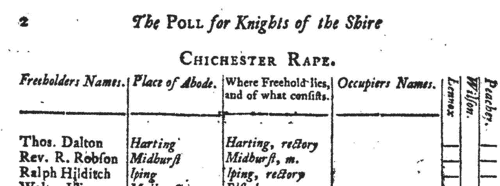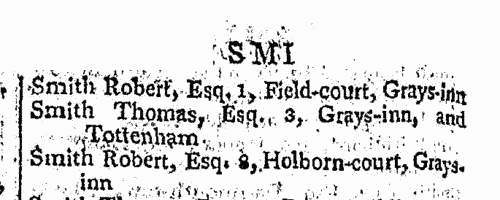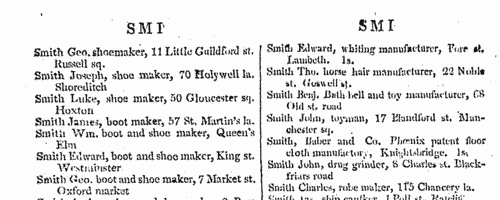Add this eBook to your basket to receive access to all 77 records. Our indexes include entries for the spelling lucking. In the period you have requested, we have the following 77 records (displaying 1 to 10): These sample scans are from the original record. You will get scans of the full pages or articles where the surname you searched for has been found. Your web browser may prevent the sample windows from opening; in this case please change your browser settings to allow pop-up windows from this site.  Masters and Apprentices
(1720) Masters and Apprentices
(1720)
Apprenticeship indentures and clerks' articles were subject to a 6d or 12d per pound stamp duty: the registers of the payments usually give the master's trade, address, and occupation, and the apprentice's father's name and address, as well as details of the date and length of the apprenticeship. 1 January to 3 September 1720. | Sample scan, click to enlarge

|  Masters of apprentices
(1755) Masters of apprentices
(1755)
Apprenticeship indentures and clerks' articles were subject to a 6d or 12d per pound stamp duty: the registers of the payments usually give the master's trade, address, and occupation, and the apprentice's name, as well as details of the date and length of the apprenticeship. 1 January to 31 December 1755. | Sample scan, click to enlarge

| Voters in Lewes rape, Sussex
(1774)
A poll of freeholders to elect two knights of the shire to represent the county of Sussex was taken at Chichester in 1774. This poll book lists each voter's full name; abode; where the freehold lay and of what it consisted (b., barn; f., farm; g., garden; h., house; l., land; m., mill; o., orchard; r., rectory; w. sh., workshop); and the name of the occupier (if any) (often surname only); with dashes in the right-hand columns indicating votes for the candidates, Lord George Henry Lennox, sir Thomas Spencer Wilson and sir James Peachey. The franchise was limited to freeholders of 40 shillings per annum and more. The sample scan shows part of Chichester rape. The rape of Lewes included Brighton, Cuckfield and Lewes and the surrounding countryside. | Sample scan, click to enlarge

|  Clerks and apprentices
(1783) Clerks and apprentices
(1783)
Apprenticeship indentures and clerks' articles were subject to a 6d or 12d per pound stamp duty: the registers of the payments usually give the master's trade, address, and occupation, and the apprentice's name, as well as details of the date and length of the apprenticeship. 23 June to 31 December 1783. IR 1/32 | Sample scan, click to enlarge

|  Apprentices and clerks
(1793) Apprentices and clerks
(1793)
Apprenticeship indentures and clerks' articles were subject to a 6d or 12d per pound stamp duty: the registers of the payments usually give the master's trade, address, and occupation, and the apprentice's name, as well as details of the date and length of the apprenticeship. 2 January to 15 June 1793. IR 1/35 | Sample scan, click to enlarge

|  Apprentices and clerks
(1803) Apprentices and clerks
(1803)
Apprenticeship indentures and clerks' articles were subject to a 6d or 12d per pound stamp duty: the registers of the payments usually give the master's trade, address, and occupation, and the apprentice's name, as well as details of the date and length of the apprenticeship. 3 January to 31 December 1803. IR 1/39 | Sample scan, click to enlarge

| Inhabitants of London
(1805)
Holden's Triennial Directory for 1805 to 1807 includes this 'London Alphabet. Private Residences'. About 10,000 people are recorded. | Sample scan, click to enlarge

| Traders and professionals in London
(1805)
Holden's Triennial Directory for 1805 to 1807 includes this 'London Alphabet of Businesses, Professions, &c.': coverage is good; about 30,000 individuals are recorded. | Sample scan, click to enlarge

| Essex Freeholders: Chelmsford hundred
(1810)
The poll of the freeholders of Essex at the election of a knight of the shire to serve in Parliament, taken at Chelmsford 31 January 1810 and fourteen following days (Sundays excepted). The candidates were John Archer Houblon esquire and Montagu Burgoyne esquire. This poll book gives the names of the voters arranged by initial letter of surname division by division. The freeholders' full names are stated, surname first, residence (often elsewhere), and place where the freehold lay. The right hand column records their votes. The qualification for suffrage in the counties was the possession of a freehold estate worth more than 40s a year. The electoral divisions comprised these hundreds: I. Barstable and Chafford; II. Becontree and Waltham; III. Chelmsford; IV. Hinckford; V. Tendring; VI. Uttleford, Clavering and Dunmow; VII. Harlow, Ongar and Freshwell; VIII. Lexden, Colchester and Witham; IX. Rochford and Thurstable; X. Dengie and Winstree.
| Sample scan, click to enlarge

| Essex Freeholders: Rochford and Thurstable hundreds
(1810)
The poll of the freeholders of Essex at the election of a knight of the shire to serve in Parliament, taken at Chelmsford 31 January 1810 and fourteen following days (Sundays excepted). The candidates were John Archer Houblon esquire and Montagu Burgoyne esquire. This poll book gives the names of the voters arranged by initial letter of surname division by division. The freeholders' full names are stated, surname first, residence (often elsewhere), and place where the freehold lay. The right hand column records their votes. The qualification for suffrage in the counties was the possession of a freehold estate worth more than 40s a year. The electoral divisions comprised these hundreds: I. Barstable and Chafford; II. Becontree and Waltham; III. Chelmsford; IV. Hinckford; V. Tendring; VI. Uttleford, Clavering and Dunmow; VII. Harlow, Ongar and Freshwell; VIII. Lexden, Colchester and Witham; IX. Rochford and Thurstable; X. Dengie and Winstree.
| Sample scan, click to enlarge

|
Research your ancestry, family history, genealogy and one-name study by direct access to original records and archives indexed by surname.
|












